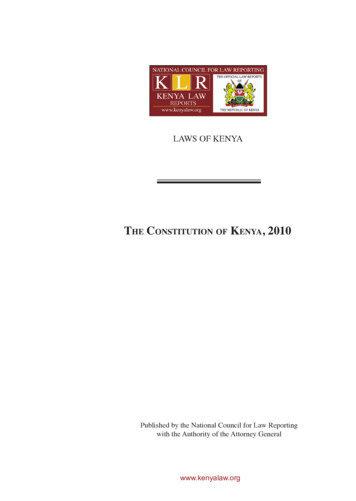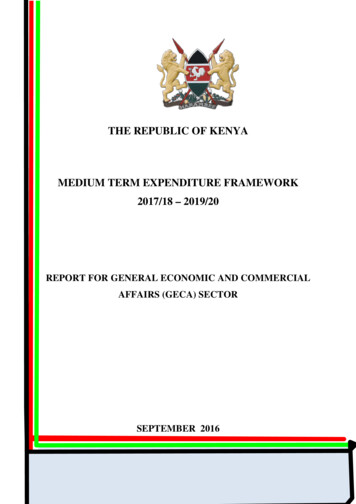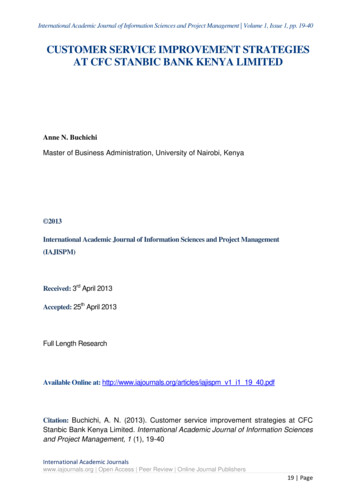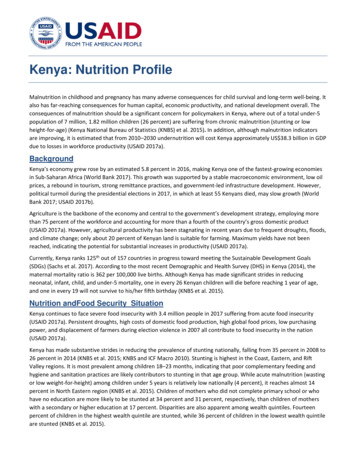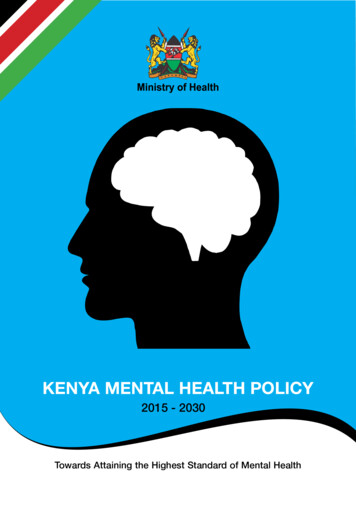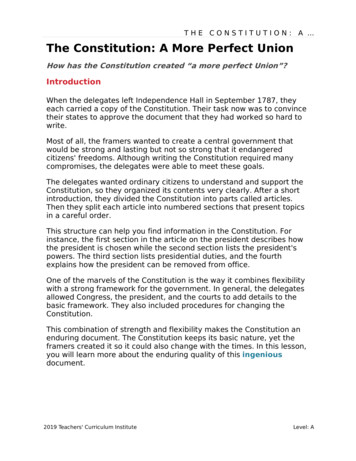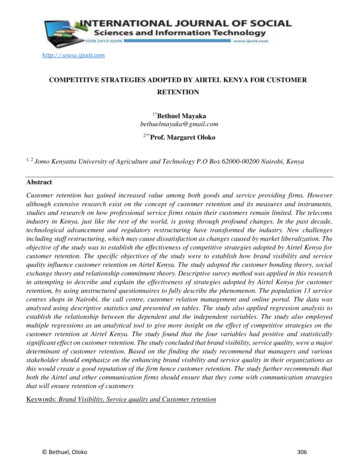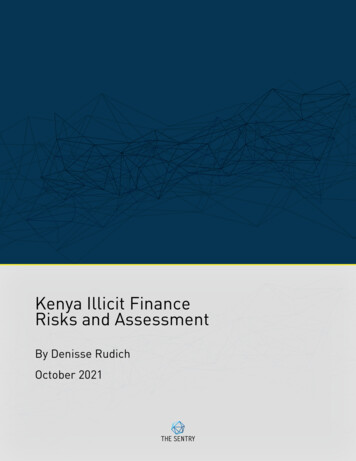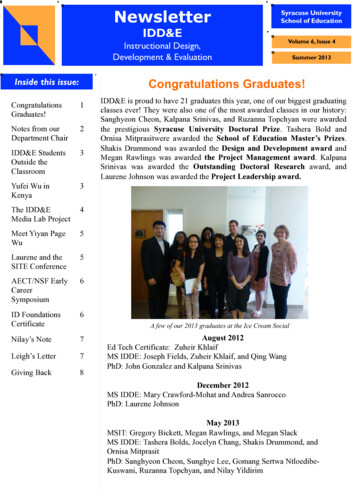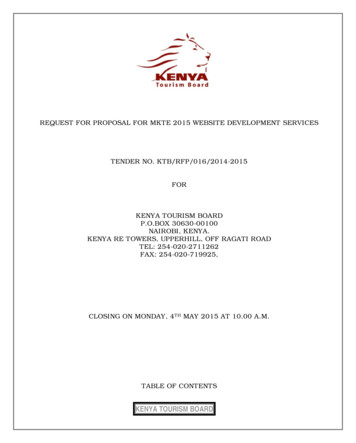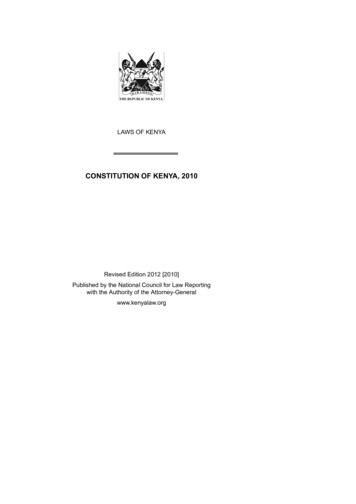
Transcription
LAWS OF KENYACONSTITUTION OF KENYA, 2010Revised Edition 2012 [2010]Published by the National Council for Law Reportingwith the Authority of the Attorney-Generalwww.kenyalaw.org
[Rev. 2012]Constitution of Kenya, 2010Const2010CONSTITUTION OF KENYAARRANGEMENT OF ARTICLESPREAMBLECHAPTER ONE – SOVEREIGNTY OF THE PEOPLE ANDSUPREMACY OF THIS CONSTITUTIONArticle1.2.3.Sovereignty of the people.Supremacy of this Constitution.Defence of this Constitution.CHAPTER TWO – THE REPUBLIC4.5.6.7.8.9.10.11.Declaration of the Republic.Territory of Kenya.Devolution and access to services.National, official and other languages.State and religion.National symbols and national days.National values and principles of ts of citizens.Retention and acquisition of citizenship.Citizenship by birth.Citizenship by registration.Dual citizenship.Revocation of citizenship.Legislation on citizenship.CHAPTER THREE – CITIZENSHIPCHAPTER FOUR – THE BILL OF RIGHTSPART 1 – GENERAL PROVISIONS RELATING TOTHE BILL OF RIGHTS19.20.21.22.23.24.25.Rights and fundamental freedoms.Application of Bill of Rights.Implementation of rights and fundamental freedoms.Enforcement of Bill of Rights.Authority of courts to uphold and enforce the Bill of Rights.Limitation of rights or fundamental freedoms.Fundamental Rights and freedoms that may not be limited.26.27.Right to life.Equality and freedom from discrimination.PART 2 – RIGHTS AND FUNDAMENTAL FREEDOMSC35-03[Issue 1]
Const2010Constitution of Kenya, 41.42.43.44.45.46.47.48.49.50.51.Human dignity.Freedom and security of the person.Slavery, servitude and forced labour.Privacy.Freedom of conscience, religion, belief and opinion.Freedom of expression.Freedom of the media.Access to information.Freedom of association.Assembly, demonstration, picketing and petition.Political rights.Freedom of movement and residence.Protection of right to property.Labour relations.Environment.Economic and social rights.Language and culture.Family.Consumer rights.Fair administrative action.Access to justice.Rights of arrested persons.Fair hearing.Rights of persons detained, held in custody or imprisoned.52.53.54.55.56.57.Interpretation of Part.Children.Persons with disabilities.Youth.Minorities and marginalised groups.Older members of society.58.State of emergency.PART 3 – SPECIFIC APPLICATION OF RIGHTSPART 4 – STATE OF EMERGENCYPART 5 – KENYA NATIONAL HUMAN RIGHTSAND EQUALITY COMMISSION59.Kenya National Human Rights and Equality Commission.CHAPTER FIVE – LAND AND ENVIRONMENTPART 1 – LAND60.61.62.63.64.Principles of land policy.Classification of land.Public land.Community land.Private land.[Issue 1]C35-04[Rev. 2012]
[Rev. 2012]Constitution of Kenya, 2010Const2010Article65.66.67.68.Landholding by non-citizens.Regulation of land use and property.National Land Commission.Legislation on land.69.70.71.72.Obligations in respect of the environment.Enforcement of environmental rights.Agreements relating to natural resource.Legislation relating to the environment.PART 2 – ENVIRONMENT AND NATURAL RESOURCESCHAPTER SIX – LEADERSHIP AND INTEGRITY73.74.75.76.77.78.79.80.Responsibilities of leadership.Oath of office of State officers.Conduct of State officers.Financial probity of State officers.Restriction on activities of State officers.Citizenship and leadership.Legislation to establish the ethics and anti-corruption commission.Legislation on leadership.CHAPTER SEVEN – REPRESENTATION OF THE PEOPLEPART 1 – ELECTORAL SYSTEM AND PROCESS81.82.83.84.85.86.87.General principles for the electoral system.Legislation on elections.Registration as a voter.Candidates for election and political parties to comply with code of conduct.Eligibility to stand as an independent candidate.Voting.Electoral disputes.PART 2 – INDEPENDENT ELECTORAL AND BOUNDARIESCOMMISSION AND DELIMITATION OF ELECTORAL UNITS88.89.90.Independent Electoral and Boundaries Commission.Delimitation of electoral units.Allocation of party list seats.91.92.Basic requirements for political parties.Legislation on political parties.PART 3 – POLITICAL PARTIESCHAPTER EIGHT – THE LEGISLATUREPART 1 – ESTABLISHMENT AND ROLE OF PARLIAMENT93.94.95.96.Establishment of Parliament.Role of Parliament.Role of the National Assembly.Role of the Senate.C35-05[Issue 1]
Const2010Constitution of Kenya, 2010[Rev. 2012]PART 2 – COMPOSITION AND MEMBERSHIP OF Membership of the National Assembly.Membership of the Senate.Qualifications and disqualifications for election as member of Parliament.Promotion of representation of marginalised groups.Election of members of Parliament.Term of Parliament.Vacation of office of member of Parliament.Right of recall.Determination of questions of membership.106.107.108.Speakers and Deputy Speakers of Parliament.Presiding in Parliament.Party leaders.109.110.111.112.113.114.115.116.Exercise of legislative powers.Bills concerning county government.Special Bills concerning county governments.Ordinary Bills concerning county governments.Mediation committees.Money Bills.Presidential assent and referral.Coming into force of laws.117.118.119.120.121.122.123.124.125.Powers, privileges and immunities.Public access and participation.Right to petition Parliament.Official languages of Parliament.Quorum.Voting in Parliament.Decisions of Senate.Committees and Standing Orders.Power to call for evidence.126.127.128.Location of sittings of Parliament.Parliamentary Service Commission.Clerks and staff of Parliament.PART 3 – OFFICES OF PARLIAMENTPART 4 – PROCEDURES FOR ENACTING LEGISLATIONPART 5 – PARLIAMENT’S GENERAL PROCEDURES AND RULESPART 6 – MISCELLANEOUSCHAPTER NINE – THE EXECUTIVEPART 1 – PRINCIPLES AND STRUCTURE OF THE NATIONAL EXECUTIVE129.130.Principles of executive authority.The National Executive.[Issue 1]C35-06
[Rev. 2012]Constitution of Kenya, 2010Const2010PART 2 – THE PRESIDENT AND DEPUTY Authority of the President.Functions of the President.Power of mercy.Exercise of presidential powers during temporary incumbency.Decisions of the President.Election of the President.Qualifications and disqualifications for election as President.Procedure at presidential election.Death before assuming office.Questions as to validity of presidential election.Assumption of office of President.Term of office of President.Protection from legal proceedings.Removal of President on grounds of incapacity.Removal of President by impeachment.Vacancy in the office of President.Functions of the Deputy President.Election and swearing-in of Deputy President.Vacancy in the office of Deputy President.Removal of Deputy President.Remuneration and benefits of President and Deputy President.152.153.154.155.Cabinet.Decisions, responsibility and accountability of the Cabinet.Secretary to the Cabinet.Principal Secretaries.156.157.158.Attorney-General.Director of Public Prosecutions.Removal and resignation of Director of Public Prosecutions.PART 3 – THE CABINETPART 4 – OTHER OFFICESCHAPTER TEN – JUDICIARYPART 1 – JUDICIAL AUTHORITY AND LEGAL SYSTEM159.160.161.162.Judicial authority.Independence of the Judiciary.Judicial offices and officers.System of courts.163.164.165.Supreme Court.Court of Appeal.High Court.PART 2 – SUPERIOR COURTSC35-07[Issue 1]
Const2010Constitution of Kenya, 2010[Rev. 2012]Article166.167.168.Appointment of Chief Justice, Deputy Chief Justice and other judges.Tenure of office of the Chief Justice and other judges.Removal from office.169.170.Subordinate courts.Kadhis’ courts.171.172.173.Establishment of the Judicial Service Commission.Functions of the Judicial Service Commission.Judiciary Fund.PART 3 – SUBORDINATE COURTSPART 4 – JUDICIAL SERVICE COMMISSIONCHAPTER ELEVEN – DEVOLVED GOVERNMENTPART 1 – OBJECTS AND PRINCIPLES OF DEVOLVED GOVERNMENT174.175.Objects of devolution.Principles of devolved .County governments.Membership of county assembly.Speaker of a county assembly.County executive committees.Election of county governor and deputy county governor.Removal of a county governor.Vacancy in the office of county governor.Functions of county executive committees.Urban areas and cities.Legislative authority of county assemblies.PART 2 – COUNTY GOVERNMENTSPART 3 – FUNCTIONS AND POWERS OF COUNTY GOVERNMENTS186.187.Respective functions and powers of national and county governments.Transfer of functions and powers between levels of government.PART 4 – THE BOUNDARIES OF COUNTIES188.Boundaries of counties.189.190.191.Cooperation between national and county governments.Support for county governments.Conflict of laws.192.Suspension of a county government.PART 5 – RELATIONSHIPS BETWEEN GOVERNMENTSPART 6 – SUSPENSION OF COUNTY GOVERNMENTSPART 7 – GENERAL193.194.Qualifications for election as member of county assembly.Vacation of office of member of county assembly.[Issue 1]C35-08
[Rev. 2012]Constitution of Kenya, 2010Const2010Article195.196.197.198.199.200.County assembly power to summon witnesses.Public participation and county assembly powers, privileges and immunities.County assembly gender balance and diversity.County government during transition.Publication of county legislation.Legislation on Chapter.CHAPTER TWELVE – PUBLIC FINANCEPART I – PRINCIPLES AND FRAMEWORK OF PUBLIC FINANCE201.202.203.204.205.Principles of public finance.Equitable sharing of national revenue.Equitable share and other financial laws.Equalisation Fund.Consultation on financial legislation affecting counties.PART 2 – OTHER PUBLIC FUNDS206.207.208.Consolidated Fund and other public funds.Revenue Funds for county governments.Contingencies Fund.PART 3 – REVENUE-RAISING POWERS AND THE PUBLIC DEBT209.210.211.212.213.214.Power to impose taxes and charges.Imposition of tax.Borrowing by national government.Borrowing by counties.Loan guarantees by national government.Public debt.215.216.217.218.219.Commission on Revenue Allocation.Functions of the Commission on Revenue Allocation.Division of revenue.Annual Division and Allocation of Revenue Bills.Transfer of equitable share.PART 4 – REVENUE ALLOCATIONPART 5 – BUDGETS AND SPENDING220.221.222.223.224.Form, content and timing of budgets.Budget estimates and annual Appropriation Bill.Expenditure before annual budget is passed.Supplementary appropriation.County appropriation Bills.225.226.227.Financial control.Accounts and audit of public entities.Procurement of public goods and services.PART 6 – CONTROL OF PUBLIC MONEYC35-09[Issue 1]
Const2010Constitution of Kenya, 2010[Rev. 2012]PART 7 – FINANCIAL OFFICERS AND INSTITUTIONSArticle228.229.230.231.Controller of Budget.Auditor-General.Salaries and Remuneration Commission.Central Bank of Kenya.CHAPTER THIRTEEN – THE PUBLIC SERVICEPART 1 – VALUES AND PRINCIPLES OF PUBLIC SERVICE232.Values and principles of public service.233.234.235.236.The Public Service Commission.Functions and powers of the Public Service Commission.Staffing of county governments.Protection of public officers.237.Teachers Service Commission.PART 2 – THE PUBLIC SERVICE COMMISSIONPART 3 – TEACHERS SERVICE COMMISSIONCHAPTER FOURTEEN – NATIONAL SECURITYPART 1 – NATIONAL SECURITY ORGANS238.239.240.Principles of national security.National security organs.Establishment of the National Security Council.241.Establishment of Defence Forces and Defence Council.PART 2 – THE KENYA DEFENCE FORCESPART 3 – THE NATIONAL INTELLIGENCE SERVICE242.Establishment of National Intelligence Service.243.244.245.246.247.Establishment of the National Police Service.Objects and functions of the National Police Service.Command of the National Police Service.National Police Service Commission.Other police services.PART 4 – THE NATIONAL POLICE SERVICECHAPTER FIFTEEN – COMMISSIONS ANDINDEPENDENT OFFICES248.249.250.251.252.253.254.Application of Chapter.Objects, authority and funding of commissions and independent offices.Composition, appointment and terms of office.Removal from office.General functions and powers.Incorporation of commissions and independent offices.Reporting by commissions and independent offices.[Issue 1]C35-10
[Rev. 2012]Constitution of Kenya, 2010Const2010CHAPTER SIXTEEN – AMENDMENT OF THIS CONSTITUTIONArticle255.256.257.Amendment of this Constitution.Amendment by parliamentary initiative.Amendment by popular initiative.CHAPTER SEVENTEEN – GENERAL PROVISIONS258.259.260.Enforcement of this Constitution.Construing this Constitution.Interpretation.CHAPTER EIGHTEEN – TRANSITIONAL ANDCONSEQUENTIAL PROVISIONS261.262.263.264.Consequential legislation.Transitional and consequential provisions.Effective Date.Repeal of previous constitution.SCHEDULESFIRST SCHEDULE –COUNTIESSECOND SCHEDULE –NATIONAL SYMBOLSTHIRD SCHEDULE –NATIONAL OATHS AND AFFIRMATIONSFOURTH SCHEDULE –DISTRIBUTION OF FUNCTIONS BETWEENTHE NATIONAL GOVERNMENT AND THECOUNTY GOVERNMENTSFIFTH SCHEDULE –LEGISLATION TO BE ENACTED BYPARLIAMENTSIXTH SCHEDULE –TRANSITIONAL AND CONSEQUENTIALPROVISIONSC35-11[Issue 1]
[Rev. 2012]Constitution of Kenya, 2010Const2010CONSTITUTION OF KENYAPREAMBLEWe, the people of Kenya—ACKNOWLEDGING the supremacy of the Almighty God of all creation:HONOURING those who heroically struggled to bring freedom and justice toour land:PROUD of our ethnic, cultural and religious diversity, and determined to live inpeace and unity as one indivisible sovereign nation:RESPECTFUL of the environment, which is our heritage, and determined tosustain it for the benefit of future generations:COMMITTED to nurturing and protecting the well-being of the individual, thefamily, communities and the nation:RECOGNISING the aspirations of all Kenyans for a government based on theessential values of human rights, equality, freedom, democracy, social justice andthe rule of law:EXERCISING our sovereign and inalienable right to determine the form ofgovernance of our country and having participated fully in the making of thisConstitution:ADOPT, ENACT and give this Constitution to ourselves and to our futuregenerations.GOD BLESS KENYAC35-13[Issue 1]
Const2010Constitution of Kenya, 2010[Rev. 2012]CHAPTER ONE – SOVEREIGNTY OF THE PEOPLEAND SUPREMACY OF THIS CONSTITUTION1. Sovereignty of the people(1) All sovereign power belongs to the people of Kenya and shall be exercisedonly in accordance with this Constitution.(2) The people may exercise their sovereign power either directly or throughtheir democratically elected representatives.(3) Sovereign power under this Constitution is delegated to the following Stateorgans, which shall perform their functions in accordance with this Constitution—(a) Parliament and the legislative assemblies in the county governments;(b) the national executive and the executive structures in the countygovernments; and(c) the Judiciary and independent tribunals.(4) The sovereign power of the people is exercised at—(a) the national level; and(b) the county level.2. Supremacy of this Constitution(1) This Constitution is the supreme law of the Republic and binds all personsand all State organs at both levels of government.(2) No person may claim or exercise State authority except as authorised underthis Constitution.(3) The validity or legality of this Constitution is not subject to challenge by orbefore any court or other State organ.(4) Any law, including customary law, that is inconsistent with this Constitutionis void to the extent of the inconsistency, and any act or omission in contraventionof this Constitution is invalid.(5) The general rules of international law shall form part of the law of Kenya.(6) Any treaty or convention ratified by Kenya shall form part of the law of Kenyaunder this Constitution.3. Defence of this Constitution(1) Every person has an obligation to respect, uphold and defend thisConstitution.(2) Any attempt to establish a government otherwise than in compliance withthis Constitution is unlawful.CHAPTER TWO – THE REPUBLIC4. Declaration of the Republic(1) Kenya is a sovereign Republic.[Issue 1]C35-14
[Rev. 2012]Constitution of Kenya, 2010Const2010(2) The Republic of Kenya shall be a multi-party democratic State founded onthe national values and principles of governance referred to in Article 10.5. Territory of KenyaKenya consists of the territory and territorial waters comprising Kenya on theeffective date, and any additional territory and territorial waters as defined by anAct of Parliament.6. Devolution and access to services(1) The territory of Kenya is divided into the counties specified in the FirstSchedule.(2) The governments at the national and county levels are distinct and interdependent and shall conduct their mutual relations on the basis of consultation andcooperation.(3) A national State organ shall ensure reasonable access to its services inall parts of the Republic, so far as it is appropriate to do so having regard to thenature of the service.7. National, official and other languages(1) The national language of the Republic is Kiswahili.(2) The official languages of the Republic are Kiswahili and English.(3) The State shall—(a) promote and protect the diversity of language of the people of Kenya;and(b) promote the development and use of indigenous languages, KenyanSign language, Braille and other communication formats andtechnologies accessible to persons with disabilities.8. State and religionThere shall be no State religion.9. National symbols and national days(1) The national symbols of the Republic are—(a) the national flag;(b) the national anthem;(c) the coat of arms; and(d) the public seal.(2) The national symbols are as set out in the Second Schedule.(3) The national days are—(a) Madaraka Day, to be observed on 1st June;(b) Mashujaa Day, to be observed on 20th October; and(c) Jamhuri Day, to be observed on 12th December.C35-15[Issue 1]
Const2010Constitution of Kenya, 2010[Rev. 2012](4) A national day shall be a public holiday.(5) Parliament may enact legislation prescribing other public holidays, andproviding for observance of public holidays.10. National values and principles of governance(1) The national values and principles of governance in this Article bind all Stateorgans, State officers, public officers and all persons whenever any of them—(a) applies or interprets this Constitution;(b) enacts, applies or interprets any law; or(c) makes or implements public policy decisions.(2) The national values and principles of governance include—(a) patriotism, national unity, sharing and devolution of power, the rule oflaw, democracy and participation of the people;(b) human dignity, equity, social justice, inclusiveness, equality, humanrights, non-discrimination and protection of the marginalised;(c) good governance, integrity, transparency and accountability; and(d) sustainable development.11. Culture(1) This Constitution recognises culture as the foundation of the nation and asthe cumulative civilization of the Kenyan people and nation.(2) The State shall—(a) promote all forms of national and cultural expression throughliterature, the arts, traditional celebrations, science, communication,information, mass media, publications, libraries and other culturalheritage;(b) recognise the role of science and indigenous technologies in thedevelopment of the nation; and(c) promote the intellectual property rights of the people of Kenya.(3) Parliament shall enact legislation to—(a) ensure that communities receive compensation or royalties for the useof their cultures and cultural heritage; and(b) recognise and protect the ownership of indigenous seeds and plantvarieties, their genetic and diverse characteristics and their use by thecommunities of Kenya.CHAPTER THREE – CITIZENSHIP12. Entitlements of citizens(1) Every citizen is entitled to—(a) the rights, privileges and benefits of citizenship, subject to the limitsprovided or permitted by this Constitution; and(b) a Kenyan passport and any document of registration or identificationissued by the State to citizens.[Issue 1]C35-16
[Rev. 2012]Constitution of Kenya, 2010Const2010(2) A passport or other document referred to in clause (1)(b) may be denied,suspended or confiscated only in accordance with an Act of Parliament thatsatisfies the criteria referred to in Article 24.13. Retention and acquisition of citizenship(1) Every person who was a citizen immediately before the effective date retainsthe same citizenship status as of that date.(2) Citizenship may be acquired by birth or registration.(3) Citizenship is not lost through marriage or the dissolution of marriage.14. Citizenship by birth(1) A person is a citizen by birth if on the day of the person’s birth, whether or notthe person is born in Kenya, either the mother or father of the person is a citizen.(2) Clause (1) applies equally to a person born before the effective date,whether or not the person was born in Kenya, if either the mother or father of theperson is or was a citizen.(3) Parliament may enact legislation limiting the effect of clauses (1) and (2) onthe descendents of Kenyan citizens who are born outside Kenya.(4) A child found in Kenya who is, or appears to be, less than eight years ofage, and whose nationality and parents are not known, is presumed to be a citizenby birth.(5) A person who is a Kenyan citizen by birth and who has ceased to bea Kenyan citizen because the person acquired citizenship of another country, isentitled on application to regain Kenyan citizenship.15. Citizenship by registration(1) A person who has been married to a citizen for a period of at least sevenyears is entitled on application to be registered as a citizen.(2) A person who has been lawfully resident in Kenya for a continuous periodof at least seven years, and who satisfies the conditions prescribed by an Act ofParliament, may apply to be registered as a citizen.(3) A child who is not a citizen, but is adopted by a citizen, is entitled onapplication to be registered as a citizen.(4) Parliament shall enact legislation establishing conditions on whichcitizenship may be granted to individuals who are citizens of other countries.(5) This Article applies to a person as from the effective date, but anyrequirements that must be satisfied before the person is entitled to be registeredas a citizen shall be regarded as having been satisfied irrespective of whether theperson satisfied them before or after the effective date, or partially before, andpartially after, the effective date.16. Dual citizenshipA citizen by birth does not lose citizenship by acquiring the citizenship of anothercountry.C35-17[Issue 1]
Const2010Constitution of Kenya, 2010[Rev. 2012]17. Revocation of citizenship(1) If a person acquired citizenship by registration, the citizenship may berevoked if—(a) the person acquired the citizenship by fraud, false representation orconcealment of any material fact;(b) the person has, during any war in which Kenya was engaged,unlawfully traded or communicated with an enemy or been engagedin or associated with any business that was knowingly carried on insuch a manner as to assist an enemy in that war;(c) the person has, within five years after registration, been convicted ofan offence and sentenced to imprisonment for a term of three yearsor longer; or(d) the person has, at any time after registration, been convicted oftreason, or of an offence for which—(i) a penalty of at least seven years imprisonment may be imposed; or(ii) a more severe penalty may be imposed.(2) The citizenship of a person who was presumed to be a citizen by birth, ascontemplated in Article 14(4), may be revoked if—(a) the citizenship was acquired by fraud, false representation orconcealment of any material fact by any person;(b) the nationality or parentage of the person becomes known, andreveals that the person was a citizen of another country; or(c) the age of the person becomes known, and reveals that the personwas older than eight years when found in Kenya.18. Legislation on citizenshipParliament shall enact legislation—(a) prescribing procedures by which a person may become a citizen;(b) governing entry into and residence in Kenya;(c) providing for the status of permanent residents;(d) providing for voluntary renunciation of citizenship;(e) prescribing procedures for revocation of citizenship;(f) prescribing the duties and rights of citizens; and(g) generally giving effect to the provisions of this Chapter.CHAPTER FOUR – THE BILL OF RIGHTSPART 1 – GENERAL PROVISIONS RELATING TO THE BILL OF RIGHTS19. Rights and fundamental freedoms(1) The Bill of Rights is an integral part of Kenya’s democratic state and is theframework for social, economic and cultural policies.(2) The purpose of recognising and protecting human rights and fundamentalfreedoms is to preserve the dignity of individuals and communities and to promotesocial justice and the realisation of the potential of all human beings.[Issue 1]C35-18
[Rev. 2012]Constitution of Kenya, 2010Const2010(3) The rights and fundamental freedoms in the Bill of Rights—(a) belong to each individual and are not granted by the State;(b) do not exclude other rights and fundamental freedoms not in the Billof Rights, but recognised or conferred by law, except to the extent thatthey are inconsistent with this Chapter; and(c) are subject only to the limitations contemplated in this Constitution.20. Application of Bill of Rights(1) The Bill of Rights applies to all law and binds all State organs and allpersons.(2) Every person shall enjoy the rights and fundamental freedoms in the Bill ofRights to the greatest extent consistent with the nature of the right or fundamentalfreedom.(3) In applying a provision of the Bill of Rights, a court shall—(a) develop the law to the extent that it does not give effect to a right orfundamental freedom; and(b) adopt the interpretation that most favours the enforcement of a rightor fundamental freedom.(4) In interpreting the Bill of Rights, a court, tribunal or other authority shallpromote—(a) the values that underlie an open and democratic society based onhuman dignity, equality, equity and freedom; and(b) the spirit, purport and objects of the Bill of Rights.(5) In applying any right under Article 43, if the State claims that it does nothave the resources to implement the right, a court, tribunal or other authority shallbe guided by the following principles—(a) it is the responsibility of the State to show that the resources are notavailable;(b) in allocating resources, the State shall give priority to ensuringthe widest possible enjoyment of the right or fundamental freedomhaving regard to prevailing circumstances, including the vulnerabilityof particular groups or individuals; and(c) the court, tribunal or other authority may not interfere with a decisionby a State organ concerning the allocation of available resources,solely on the basis that it would have reached a different conclusion.21. Implementation of rights and fundamental freedoms(1) It is a fundamental duty of the State and every State organ to observe,respect, protect, promote and fulfil the rights and fundamental freedoms in the Billof Rights.(2) The State shall take legislative, policy and other measures, including thesetting of standards, to achieve the progressive realisation of the rights guaranteedunder Article 43.(3) All State organs and all public officers have the duty to address the needsof vulnerable groups within society, including women, older members of society,persons with disabilities, children, youth, members of minority or marginalisedcommunities, and members of particular ethnic, religious or cultural communities.C35-19[Issue 1]
Const2010Constitution of Kenya, 2010[Rev. 2012](4) The State shall enact and implement legislation to fulfil its internationalobligations in respect of human rights and fundamental freedoms.22. Enforcement of Bill of Rights(1) Every person has the right to institute court proceedings claiming that a rightor fundamental freedom in the Bill of Rights has been denied, violated or infringed,or is threatened.(2) In addition to a person acting in their own interest, court proceedings underclause (1) may be instituted by—(a) a person acting on behalf of another person who cannot act in theirown name;(b) a person acting as a member of, or in the interest of, a group or classof persons;(c) a person acting in the public interest; or(d) an association acting in the interest of one or more of its members.(3) The Chief Justice shall make rules providing for the court proceedingsreferred to in this Article, which shall satisfy the criteria that—(a) the rights of standing provided for in clause (2) are fully facilitated;(b) formalities relating to the proceedings, including commencement ofthe proceedings, are kept to the minimum, and in particular thatthe court shall, if necessary, entertain proceedings on the basis ofinformal documentation;(c) no fee may be charged for commencing the proceedings;(d) the court, while observing the rules of natural justice, shall not beunreasonably restricted by procedural technicalities; and(e) an organisation or individual with particular expertise may, with theleave of the court, appear as a friend of the court.(4) The absence of rules contemplated in clause (3) does not limit the rightof any person to commence court proceedings under this Article, and to have thematter heard and determined by a court.23. Authority of courts to uphold and enforce the Bill of Rights(1) The High Court has jurisdiction, in accordance with Article 165, to hear anddetermine applications for redress of a denial, violation or infringement of, or threatto, a right or fundamental freedom in the Bill of Rights.(2) Parliament shall enact legislation to give original jurisdiction in appropriatecases to subordinate courts to hear and determine applications for redress of adenial, violation or infringement of, or
CONSTITUTION OF KENYA, 2010 Revised Edition 2012 [2010] Published by the National Council for Law Reporting with the Authority of the Attorney-General www.kenyalaw.org . Access to justice. 49. Rights of arrested persons. 50. Fair hearing. 51. Rights of persons detained, held in custody or imprisoned. PART 3 - SPECIFIC APPLICATION OF RIGHTS
